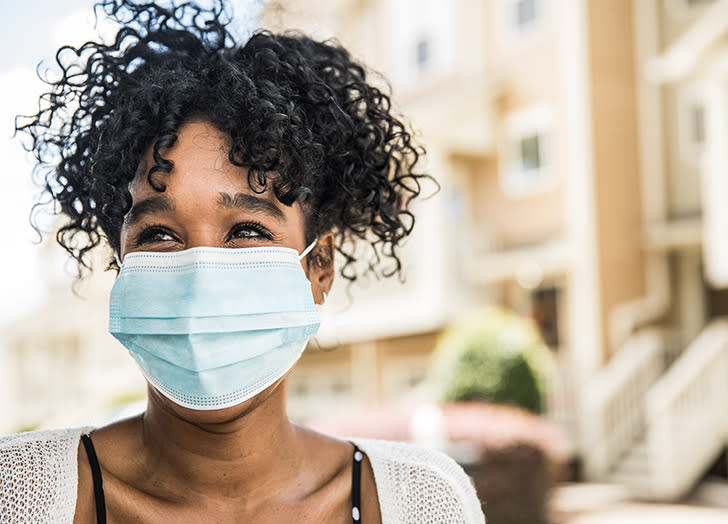8 Doctor-Recommended Ways to Avoid Getting Sick This Spring

Spring has sprung…but that doesn’t mean you’re suddenly immune to sniffles, coughs and sore throats. With the COVID-19 pandemic still ongoing, it’s more important than ever to adopt healthy habits, even as the weather begins to warm up. But we have great news: According to family physician Dr. Jen Caudle, D.O., there are eight things you can start doing right this minute to help you and your family stay healthy all season long. Get the details below.

1. Wash Your Hands
If you’ve started getting lazy with hand-washing, now is the time to review your technique. “Hand-washing is one of our best defenses against viruses, bacteria and other germs, especially now during the COVID pandemic,” says Dr. Caudle. While it doesn’t matter what temperature water you use, one common oversight is not enough soap. Get it all over your hands, underneath your nails and between your fingers. Scrub for at least 20 seconds, then rinse.

2. Wear a Mask
While we never expected masks to become a must-have accessory, it’s extremely important to continue to keep up mask-wearing this spring. And in addition to preventing the spread of COVID-19, masks have an added benefit. “Mask-wearing is not only good for COVID prevention but likely also helps us prevent the spread of other illnesses,” Dr. Caudle tells us, adding that flu cases have been relatively low this season. Some experts are recommending double-masking and wearing masks with multiple layers, and according to Dr. Caudle, this could add extra protection. But the most important thing you can do? Wear a mask that fits properly.

3. Eat Healthy
The most important thing you can do to give your immune system a boost? Eat healthy foods. “When we talk about staying well this spring, eating a nutritionally balanced diet is going to be important,” Dr. Caudle says. But while it might be tempting to overhaul your whole eating routine and go on a crash diet, the best healthy eating plan is one that you can actually maintain in the long run. Think lots of fruits and veggies, lean protein and whole grains.

4. Quit Smoking
If you are a smoker (yes, e-cigarette users, you, too), now is the time to call it quits. “We know that smoking is a risk factor for severe complications for COVID-19,” says Dr. Caudle. “It puts people at higher risk.” Aside from the coronavirus, smoking wreaks havoc on the body and can reduce your life expectancy. Try nicotine patches, gnawing on carrot sticks, hypnosis—whatever it takes to quit for good.

5. Exercise
Blame it on the pandemic, but exercise is something we know we should be doing more of, but haven’t had much time to do lately. So instead of vowing to go on a five-mile run every day, Dr. Caudle suggests a routine that’s a bit more manageable. “The world is so crazy, and sometimes making a blanket recommendation doesn’t work,” she says. “Just do more than what you have been doing.” She has been making an effort to do ten sit-ups and ten push-ups daily, because she knows it’s a realistic exercise routine she can stick to.

6. Get Vaccinated
If you haven’t gotten your annual flu shot, the time is now. “It’s not too late,” Dr. Caudle says, adding that it’s also a great time to get the pneumonia shot, if you qualify. And as soon as you’re eligible for the COVID-19 vaccination, it’s important for you to take your turn, according to the CDC. “Making sure we’re up to speed on all of our vaccines is very important for preventing illness,” she says.

7. Keep Your Stress in Check
After an exhausting week at work (followed by an even more exhausting weekend with your kids), taking time to check in with yourself is probably not high on your priority list…but it should be. “It’s tough these days, given all that the world is dealing with, but stress can really impact our bodies, our mind and our immune systems,” says Dr. Caudle. “Trying to minimize stress through whatever way works for you: talking to friends or family, seeking out professional care, taking a minute and turning your cell phone off. Any way that you can minimize stress is going to be helpful.”

8. Manage Your Symptoms
Despite your best efforts, you still came down with a bug. Argh. If this happens, don’t sweat it, says Dr. Caudle. “If you do become ill, managing symptoms is very important and can affect how you feel as you’re fighting off the illness,” she explains. “An over-the-counter medicine like Mucinex, if appropriate for your symptoms, can help control some of the symptoms that you may have during a common cold or the flu. It can help you feel more comfortable and get the rest you need.” And, as always, consult your healthcare provider if you think you may have COVID-19 or your symptoms are severe.